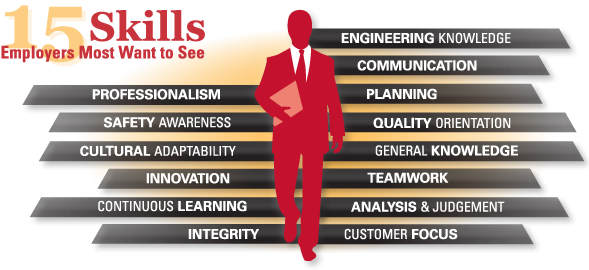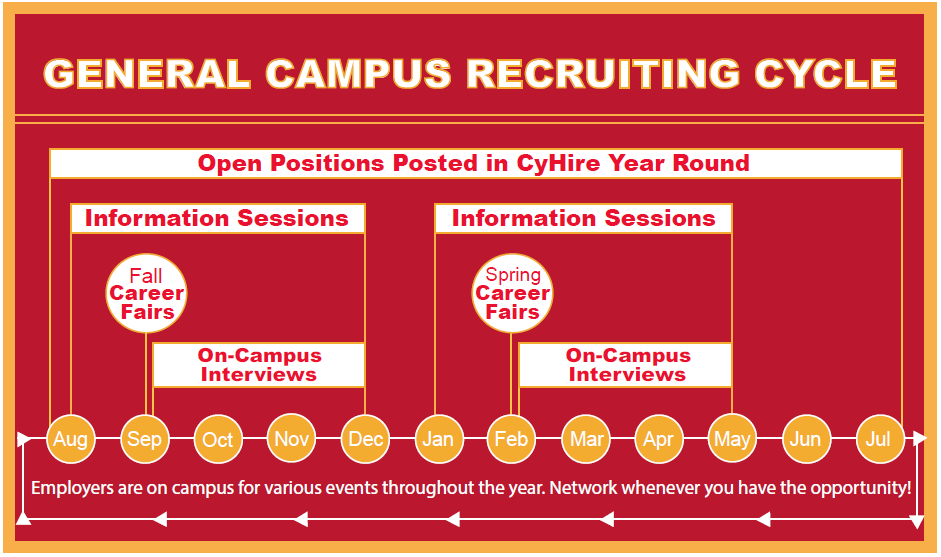Before spending time preparing a resume or searching for a job, it is important to understand a little about the engineering needs of employers and the college recruiting process. The needs of employers vary significantly, but there are some general characteristics that a large majority of employers look for when reviewing resumes and interviewing to fill engineering positions. Once you understand what employers are seeking, it is important to understand how they conduct their search. The college recruiting process brings employers to campus specifically to network with students that will soon be entering the job market. Your job search process needs to take place throughout your college career to take advantage of the special opportunities that the college recruiting process provides to students.
Step 1: Understand Employers and the College Recruiting Process
What questions are employers looking to answer
When working to fill positions, employers try to answer these four questions:
- Is the candidate a person of good character?
- Does the individual have the qualifications needed to do the job or can they be trained in a reasonable amount of time?
- Is the individual a good fit for the position and the company culture so the team will be happy and productive?
- Is the individual likely to be a long-term employee?
Employers are looking to hire individuals that will work hard, not cause problems in the workplace, and be a good reflection of the company. Good character is of utmost importance, and most employers would never intentionally hire a person of questionable character. Some of the character traits that employers value include:
- Honest and trustworthy
- Dependable
- Hardworking
- Self-motivated
- Team-oriented (puts team success above personal interests)
- Flexible
- Confident yet willing to accept constructive criticism
- Caring and respectful
- Friendly and outgoing
- Positive thinking (positive attitude)
The general expectations that employers have for entry-level engineers are clearly defined by the Accreditation Board for Engineering and Technology (ABET) in the accreditation process of engineering programs. Accreditation provides students, employers and society with a level of assurance that a program meets the quality standards that produce graduates who are prepared to enter a global workforce. The ABET student outcomes describe what students are expected to know and be able to do by the time of graduation, and they include the ability to:
- We work with the companies and supervisors on the front end to ensure that your work experience is well supervised and focused on engineering. We work to make sure that the time and effort you spend on internships is maximized for your learning.
- Hours worked as part of an educational institution supervised co-op or summer internship can be counted towards the work experience requirements needed to qualify for a professional engineering (P.E.) license. The student must register the work experience so it will appear on the college transcript. Each semester alumni request a past internship be retroactively added to their transcript, but we cannot do that, so be sure to register all your experiences.
- Employers see internships and co-ops that are noted on transcripts and not just a resume as more professional because they are part of an academic program.
- Maintain full-time student status without tuition and fees.
- If you were to have issues during your internship, we can help you if you are registered because you would be considered a student and in an academic program.
- Special course on Canvas with additional resources for registered co-ops/internships students. The surveys take about one hour total to complete throughout the course of your experience.
- ISU uses the information in the surveys as part of the ABET accreditation process. If students opt out of registering for internships, this could affect the ABET accreditation.
Each of the above abilities requires the application of a certain mix of knowledge, understanding, behaviors and skills. The College of Engineering worked with a large group of employers to identify the key competencies that are required in the practice of engineering, which align with the ABET student outcomes. These are shown in the graphic below. The specific knowledge, behaviors and skills that a particular employer is seeking can be found by carefully reading their job descriptions.

The engineering curriculum at Iowa State University was developed, and is continuously being improved, to ensure students achieve the competencies that employers want to see in graduates. Be sure to take advantage of the opportunities to develop your engineering competencies and professional skills through coursework, co-ops/internships, student organization projects and other activities. Feedback from employers indicate that they are generally very happy with the skills of entry-level engineers and when there are problems it is usually due to issues such as lack of motivation or poor attitude rather than a lack of skills.
Since many candidates have similar qualifications, fit for the position factors heavily into hiring decisions. The following three fit factors are often formally or informally considered. Candidates that show matching interests will have an advantage over other job seekers.
Job/Work Fit – Employers look for individuals who have a strong interest or passion for the type of work that needs to be done. These individuals will put more effort into their work, take more pride in their work, enjoy their jobs more, and are likely to stay in their positions longer.
Organization Fit – Employers also want to ensure a good fit with the team and company culture. When the fit is good, teamwork is more effective, people enjoy being at work more, and employee turnover is lower.
Location Fit – The geographic location and community preferences of candidates are also often given consideration. Employers want to hire individuals who will be happy living in the vicinity of the work location. This is a consideration even when filling internship positions since many employers are hoping to convert some of their interns to full-time employees. Employers located in rural areas and smaller communities often have smaller applicant pools and are eager to hear from candidates with a preference for small town living. Similarly, employers in large cities or in faraway places may have concerns about candidates who are unsure about city living or being far away from home.
Employers are usually looking to hire individuals who have the potential to become long-term employees. Hiring and training a new employee is costly and has a negative impact on productivity, so employers prefer not to go through the process any more than necessary. Candidates who are potential long-term employees often have ties to the area (e.g. family or friends nearby or grew up in a similar community) and have career goals that align with the organization’s needs. Emphasizing these connections can give a candidate an advantage over other similarly-qualified candidates.
Evaluating Entry-Level and Internship Candidates
Since many students and graduates complete similar coursework, employers largely differentiate job candidates based on their grade point average (GPA), the amount and quality of their skill-building experiences outside the classroom, and the ‘fit factors’ mentioned above.
Good grades are important and indicate that you have the ability to learn, have high quality standards, and have mastered certain skills. There is a fairly strong linear correlation between (GPA) and employment at graduation. Many entry-level jobs require applicants to have at least a 3.0 GPA, and job opportunities decline about 10% for every tenth of a point GPA falls below 3.0. Some employers also use GPA as a way to limit the size of their applicant pools or quickly filter out a portion of candidates when reviewing applications. Additionally, your GPA at graduation will likely affect your starting salary, so there is good incentive to do your best in your courses.
A good GPA alone is not sufficient; “straight-A” students have difficulty securing employment when this is all they have to put on their resumes. In addition to good grades, employers want to see work experiences during which transferable skills were developed. All work experiences are valuable and can be used on your resume to highlight skills, but employers especially value professional engineering work experiences, such as co-ops and internships. Co-ops and internships are professional positions where the employer has agreed to make it a learning experience and help you develop workplace skills as you complete engineering tasks.
Participation in student clubs or volunteer organizations provides additional skill-building opportunities that many work experiences don’t offer. It’s not enough to simply belong to an organization; you need to contribute. Employers want to see that you have practiced your teamwork, leadership, communication, project management and other skills by actively contributing. Holding an official leadership position looks very good on a resume but leading any team effort indicates leadership potential and is helpful.
Employers like “well-rounded” or “T-shaped” individuals. These individuals have technical depth in their area of study, but also have a wide range of interests. They are generally inquisitive and enjoy learning. Since engineers often contribute to multidisciplinary team efforts, it is important that they know a little about other disciplines. Attend presentations and interact with other students outside of your major when the subject interests you.
The College Recruiting Schedule
Employers recruit year-round, but there is a cycle to the college recruiting process. Most large employers put their college recruiting plans together during the summer break. When classes resume in the fall employers will begin visiting campus to start networking with students, faculty and staff. They are looking to connect with the talent they need, increase name recognition and generate interest in their company and the positions they need to fill. The Fall Engineering Career Fair is held near the end of September and this is the official start of the recruiting season. The networking that is done prior to and at the career fair will result in several thousand on-campus interviews as well as off-campus interviews in an 8 week period following the fair. On-campus interviewing and nearly all of the recruiting activity for the semester ends the week prior to finals. The process begins again at the start of the spring semester.
Some companies try to fill as many positions as possible during the fall semester and then focus on a smaller number of harder to fill positions during the spring semester. In the fall, they will be working to fill post-graduation positions with both fall and spring semester graduates, and fall, spring and summer co-op and internship positions. In the spring, they are generally looking for spring graduates to fill post-graduation positions and students to fill summer and fall experiential education positions. Keep in mind that companies have hiring needs that arise at all times of the year. New jobs are posted in CyHire every week of the year, so it should be checked regularly.

